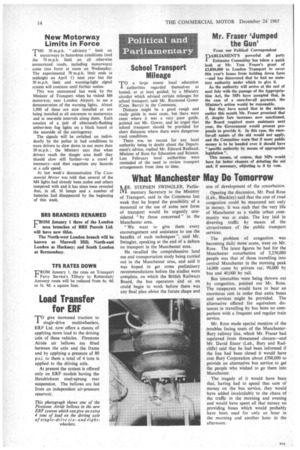What Manchester May Do Tomorrow
Page 16

If you've noticed an error in this article please click here to report it so we can fix it.
MR. STEPHEN SWINGLER, Parliamentary Secretary to the Ministry of Transport, said in the Commons last week that he hoped the possibility of a monorail or the use of some new form of transport would be urgently considered "by those concerned" in the Manchester area.
"We want to give them every encouragement and assistance to use the benefits of such techniques ", said Mr. Swingler, speaking at the end of a debate on transport in the Manchester area.
He recalled the comprehensive land use and transportation study being carried out in the Manchester area, and said it was hoped to get some preliminary recommendations before the studies were complete, on which the British Railways Board, the bus operators and so on could begin to work before there was any final plan about the future shape and size of development of the conurbation.
Opening the discussion, Mr. Paul Rose (Lab., Blackley) said that the cost of road congestion could be measured not only in money. It was such that the very life of Manchester as a viable urban community was at stake. The key laid in diverting traffic by means of the attractiveness of the public transport services.
The problem of congestion was becoming daily more acute, went on Mr. Rose. The latest figures he had for the Manchester conurbation of 2,250,000 people was that of those travelling into central Manchester in the morning peak 14,000 came by private car; 90,000 by bus and 40,000 by rail.
Bus timetables were being thrown out by congestion, pointed out Mr. Rose. The ratepayers would have to bear an enormous cost in order that extra buses and services might be provided. The alternative offered for equivalent distances in travelling by bus bore no comparison with a frequent and regular train service.
Mr. Rose made special mention of the troubles facing users of the ManchesterBury railway line, which Mr. Fraser had reprieved from threatened closure—and Mr. David Ensor (Lab., Bury and Radcliffe) said that he had been informed if the line had been closed it would have cost Bury Corporation about £500,000 to provide an alternative bus service to get the people who wished to go there into Manchester.
The tragedy of it would have been that, having had to spend that sum of money on the bus service, they would have added incalculably to the chaos of the traffic in the morning and evening and would have spent all that money on providing buses which would probably have been used for only an hour in the morning and another hour in the afternoon.












































































